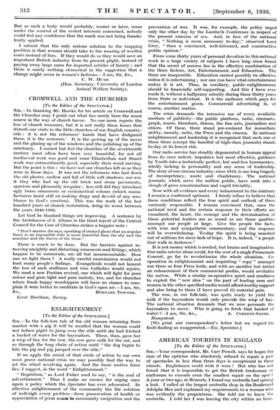CROMVVELL AND THE CHURCHES
[To the Editor of the SPECTATOR.] SIR,—In thanking Mr. Hawke for his article on Cromwell and the Churches may I point out what has surely been the worst source in the way of church havoc. No one more regrets the loss of church treasures, but it is not really these losses that disturb our visits to the little churches of our English country- side : it is not the reformers' hands that have disfigured them, it is the restorers.' It is the pewing up of the naves and the glazing up of the windows and the polishing up of the sanctuary. I cannot but feel the churches of the seventeenth Century must often have been very beautiful, for not all mediaeval work was good and some Elizabethan and Stuart work was extraordinarily good, especially their wood carving. But the point is this : we have not our churches left us as they were in those days. It was not the reformers who had down the old plaster, mellow and full of little soft shadows, nor was it they who had up the old brick and stone pavements, spacious and pleasantly irregular ; less still did they introduce ugly brass ornaments or ecclesiastical colours (which manu- facturers insist still on making dingy and devoid of any sem- blance to God's creation). This was the work of the last hundred years of church restoration, doing its worst between the years 1840-1880.
Let God be thanked things are improving. A sentence by the Archdeacon of S. Albans in the third report of the Central Council for the Care of Churches strikes a happier note :
"Don't assume (he says, speaking of stained glass) that an angular Saint in an impossible robe is more beautiful than the sky and the sunshine and the leaves of the trees."
There is much to be done. But the barriers against re- moving unsightly and disturbing ornaments and fittings, which happen to be memorials, are all but insurmountable. How can we fight them ? A really careful examination would not hurt many people's feelings. Evangelicals would not lament the loss of such stuffiness and wise Catholics would rejoice. We need a new Puritan revival, one which will fight for pure colour and pure light and pure melody, too, and for churches where frank happy worshippers will have no chance to com- plain it were better to meditate in God's open air.—I am, Sir,
BERNARD TOWNER.
Great Bookham, Surrey.






























 Previous page
Previous page